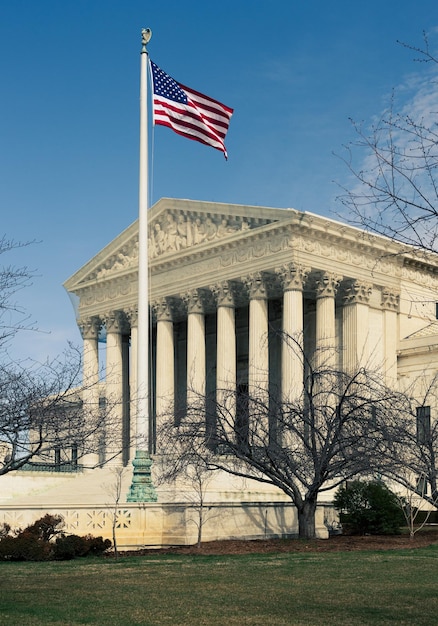Supreme Court to Review Immigration Policy Changes Next Month: What to Expect

Anúncios
Breaking: Supreme Court to Hear Arguments on Immigration Policy Changes Next Month, potentially reshaping key aspects of US immigration law and enforcement.
The Breaking: Supreme Court to Hear Arguments on Immigration Policy Changes Next Month, a decision with significant ramifications for millions of people and the future of US immigration policy. This pivotal moment could redefine the scope of executive power and the rights of immigrants.
Supreme Court Set to Deliberate Immigration Policies
The Supreme Court’s decision to hear arguments on immigration policy changes next month has ignited a national debate. These changes, primarily implemented through executive action, have faced legal challenges, raising questions about their constitutionality and impact. The court’s ruling will have far-reaching consequences.
The upcoming arguments center on several key aspects of immigration law. These include the authority of the executive branch to set immigration priorities, the legality of certain enforcement policies, and the due process rights of immigrants. Understanding these complexities is crucial to grasping the potential outcomes.
Key Immigration Policies Under Scrutiny
Several specific immigration policies are under scrutiny in the Supreme Court case. These policies, often implemented through executive orders or agency guidance, have significantly altered immigration enforcement and the treatment of asylum seekers. Here’s a closer look at the policies at stake:
Executive Authority on Immigration
The extent of the executive branch’s authority to implement immigration policies is a central question. The court will examine whether the president overstepped his authority in issuing directives that contradict or alter existing laws.
Enforcement Priorities
The legality of policies that prioritize certain types of immigrants for enforcement actions is also under review. The court will consider whether these policies are consistent with congressional mandates and constitutional protections.
- Deferred Action for Childhood Arrivals (DACA): Its future hangs in the balance, impacting thousands of young immigrants.
- Asylum Procedures: Changes to asylum procedures at the border face legal challenges.
- Detention Policies: The scope of immigration detention and the rights of detainees are being questioned.

The Supreme Court’s decision will have a profound impact on the lives of immigrants and the broader immigration system. The outcome could reshape the legal landscape and set precedents for future administrations.
The Legal Challenges and Arguments
The immigration policy changes have faced numerous legal challenges, primarily from states and advocacy groups. These challenges argue that the policies violate administrative law, constitutional rights, and established legal principles. Examining the core arguments is essential to understanding the case.
Plaintiffs argue that the executive branch has exceeded its authority by implementing policies that conflict with existing laws. They also contend that the policies violate due process rights and discriminate against certain groups of immigrants.
States’ Rights and Immigration
Several states have joined the legal challenges, arguing that the immigration policies impose significant costs on state resources and infringe on their rights. The court will need to weigh the states’ interests against the federal government’s authority over immigration.
Impact on Due Process
Advocates for immigrants’ rights argue that the policies violate due process protections by denying immigrants a fair opportunity to present their case and seek legal remedies. The court will consider these arguments in light of established constitutional principles.
The Supreme Court’s decision will depend on its interpretation of the relevant statutes, constitutional provisions, and legal precedents. The justices will carefully consider the arguments presented by both sides before issuing a ruling.
Potential Outcomes and Their Impact
The Supreme Court’s forthcoming decision could have a wide range of outcomes, each with significant implications for immigration policy. The court could uphold the policies, strike them down, or issue a more nuanced ruling that addresses specific aspects of the changes. Understanding these potential outcomes is crucial.
If the court upholds the policies, the executive branch will have greater latitude to implement its immigration agenda. This could lead to stricter enforcement, increased deportations, and further restrictions on asylum access.

Striking Down the Policies
If the court strikes down the policies, the government will be forced to revert to the previous legal framework. This could lead to a more lenient approach to immigration enforcement and greater protections for immigrants’ rights.
Nuanced Ruling
The court could also issue a more nuanced ruling that upholds some aspects of the policies while striking down others. This could create a complex legal landscape and require further clarification from the courts.
- Continued Legal Battles: Regardless of the outcome, further legal challenges are likely.
- Legislative Action: Congress could attempt to codify or overturn the policies through legislation.
- Shift in Enforcement: The administration could adjust its enforcement priorities in response to the ruling.
The Supreme Court’s decision will have a long-lasting impact on the US immigration system. The outcome will shape the rights of immigrants, the scope of executive power, and the future of immigration reform.
Public and Political Reactions to the Case
The Supreme Court’s decision to hear arguments on immigration policy changes has elicited strong reactions from the public and political leaders. The case has become a lightning rod for debate, highlighting deep divisions over immigration reform and the role of the federal government. Examining these reactions is crucial to understanding the broader context of the case.
Supporters of the policies argue that they are necessary to protect national security and enforce existing immigration laws. They often emphasize the need for stricter border control and increased deportations.
Criticism and Opposition
Critics of the policies argue that they are inhumane, violate due process rights, and undermine the principles of fairness and equality. They often call for comprehensive immigration reform that provides a pathway to citizenship for undocumented immigrants.
Political Implications
The case has significant political implications, particularly in the lead-up to the next election. The outcome could energize voters on both sides of the issue and influence the political debate over immigration reform.
The Supreme Court’s decision will likely be a defining moment in the ongoing debate over immigration policy. The ruling will have far-reaching consequences for the millions of people who call the United States home.
The Role of the Supreme Court in Immigration Law
The Supreme Court has played a pivotal role in shaping immigration law throughout US history. The court’s decisions have addressed a wide range of issues, including the rights of immigrants, the scope of federal authority, and the interpretation of immigration statutes. Understanding the court’s historical role is essential to appreciating the significance of the current case.
The Supreme Court has often served as a check on the power of the executive and legislative branches in the area of immigration. The court has struck down policies that violate constitutional rights or exceed statutory authority.
Landmark Cases
Several landmark cases have significantly shaped immigration law. These include decisions on birthright citizenship, deportation procedures, and the rights of asylum seekers. The court’s interpretations of these issues have had a lasting impact on the US immigration system.
The Supreme Court’s decision in the current case will add to its legacy in the area of immigration law. The ruling will set precedents for future cases and shape the legal landscape for years to come.
Preparing for the Future of Immigration Policy
Regardless of the Supreme Court’s decision, preparing for the future of immigration policy is essential. The issue is likely to remain a central focus of public debate and political action for years to come. Understanding the potential challenges and opportunities is crucial.
Policymakers, advocates, and community leaders must work together to develop comprehensive and effective immigration policies. These policies should balance the need for border security with the rights and dignity of immigrants.
Comprehensive Reform
Comprehensive immigration reform is needed to address the root causes of the immigration crisis and create a fair and orderly system. This reform should include a pathway to citizenship for undocumented immigrants, increased border security, and improved enforcement mechanisms.
By working together, stakeholders can create a more just and humane immigration system that reflects the values of the United States.
| Key Aspect | Brief Description |
|---|---|
| ⚖️ Supreme Court Review | The Supreme Court will hear arguments on immigration policy changes next month. |
| 📜 Policies Under Scrutiny | Several executive actions on immigration enforcement and asylum procedures are being challenged. |
| 📢 Legal Arguments | Challenges focus on executive overreach, due process, and states’ rights. |
| 🌍 Potential Impact | The ruling could significantly reshape US immigration law and enforcement. |
Frequently Asked Questions
▼
The Supreme Court is reviewing policies related to enforcement priorities, asylum procedures, and executive authority in immigration matters.
▼
The policies are being challenged on the grounds that they exceed executive authority, violate due process rights, and harm states’ interests.
▼
The court could uphold, strike down, or issue a nuanced ruling that addresses specific aspects of the immigration policy changes.
▼
The decision could significantly alter the rights of immigrants, the scope of executive power, and the future of immigration reform efforts.
▼
The Supreme Court has historically played a pivotal role in shaping immigration law through landmark cases addressing various aspects of immigration policy.
Conclusion
The Supreme Court’s upcoming arguments on immigration policy changes represent a crucial moment for the United States. The court’s decision will have far-reaching consequences, shaping the lives of millions and defining the future of immigration law for generations to come. It is imperative that policymakers, advocates, and the public remain engaged and informed as this case progresses.